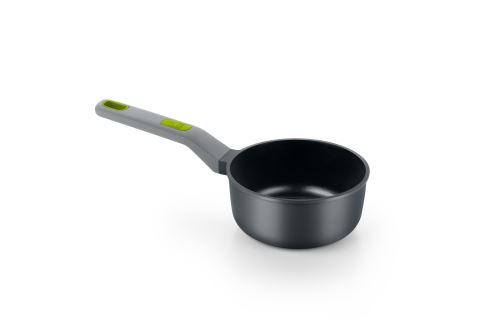BRA Frying pan LIFE 16 cm, PTFE-Free
| Your price incl. VAT | 599 Kč |
| Your price excl. VAT | 495 Kč |
| Code | A523816 |
| PFAS-Free - Výrobek neobsahuje "věčné chemikálie"? | Ano |
| Material | Non-stick surface without Teflon |
| Can be used on an induction cooker? | Yes |
| Diameter | 16 cm |
| Weight | 0,55 kg |
| Manufacturer / Supplier | Isogona, s.l. |
| What material is the core (form) of the product made of | Aluminium |
| APEO -Free - Does the product not contain Alkylphenol? | Yes |
| Overall size including handle, handle or handle | 35 cm |
| PFOA-Free - Product does not contain Perfluorooctanoic acid? | Yes |
| Bottom diameter (outer) | 10,5 cm |
| Bottom diameter (inner) | 12 cm |
| PTFE-Free - Does the product not contain Polytetrafluoroethylene (Teflon)? | Yes |
| Dishwasher safe | Yes |
| Depth | 7,5 cm |
| Warranty | 24 months |
The BRA LIFE collection is made of 100% recycled (certified) cast aluminum with high resistance to deformation with an excellent performance Fusion Pro® non-stick ceramic coating (2 times more resistance and performance than other ceramics on the market) and PFAS-free (see info below).
It adapts to all types of hobs, including induction, for which it is particularly effective thanks to the Full Induction System bottom, stainless steel ground bottom.
The pan is suitable for the dishwasher - however, we recommend hand washing to extend the life of the non-stick surface.
The Life range is BRA's latest collection with a lower environmental impact. Thanks to its high-quality materials, it allows you to cook with less oil for a healthier kitchen and achieve the highest perfection in your recipes.
What is PFAS?
Perfluoroalkyl Chemicals (PFAS)
Per- and polyfluoroalkyl substances (PFAS) are a large group of thousands of synthetic chemicals that are widely used throughout society and found in the environment.
They all contain carbon-fluorine bonds, which are one of the strongest chemical bonds in organic chemistry. This means that they resist decomposition in use and in the environment. Most PFASs are also easily transported in the environment over long distances from the source of their release.
PFASs have often been observed to contaminate groundwater, surface water, and soil. Cleaning up contaminated sites is technically demanding and expensive. If their release continues, they will continue to accumulate in the environment, drinking water and food.
